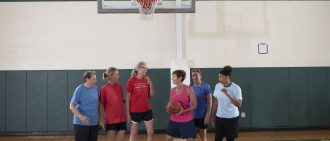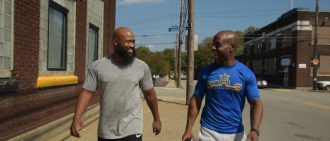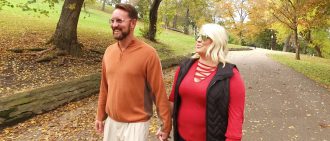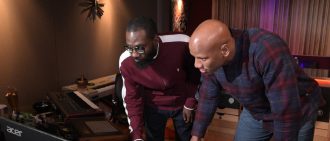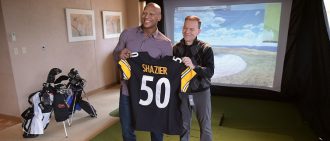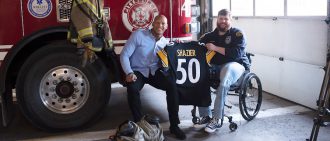Sickle cell disease kept Julian Cann in and out of the hospital as a child and young adult. Then, he realized he could make a change. He improved his diet and exercise and found another outlet for his pain in music. Now an advocate for sickle cell awareness, Julian hasn’t had a hospital stay in 10 years. Learn his story in the fifth episode of “Ryan Shazier’s 50 Phenoms.”
Listen to more episodes of Ryan Shazier’s 50 Phenoms Podcast
Ryan Shazier's 50 Phenoms Season 1 Podcast
Read The Full Podcast Transcript
Announcer: Phenomenal determination, phenomenal story. Next, on “Ryan Shazier’s 50 Phenoms”: from painful disease to performing artist.
Julian Cann: ‘Cause I want to be outside, living my life, doing music, and working. It just got real old to me at this point. That’s the last time I was in the hospital. I changed my life around shortly after that.
Announcer: In this episode of “50 Phenoms,” Ryan Shazier talks with Julian Cann, who has battled sickle cell disease his whole life.
Julian Cann: Just getting more into things that was going to keep me busy as opposed to just keep me stagnant and sitting around and letting the disease catch up to you.
Ryan Shazier: I think that advice is best for anybody dealing with sickle cell, scoliosis, you know, life, diabetes, anything. I feel eating healthy and trying to better yourself, you grow as a person in general.
Announcer: This is the story of how he fought through the pain and found meaning through music.
Ryan Shazier: I knew you grew up with sickle cell from a young age. What was that like?
Julian Cann: I mean, the best word to describe it, if I could use one word, is just challenging. Besides my sickle cell, the situations growing up, and having crises and things like that, I had a pretty good childhood. You know, it was real challenging, realizing that, you know, you can’t play football. It really hindered my sports and even kind of hindered my education, so, you know, it was just a lot of different challenges that I had to, you know, overcome.
Ryan Shazier: Like what are some of things you had to overcome besides sports, and how did it affect school?
Julian Cann: Yeah, well, it affected school because, you know, when it gets cold, you tend to get more flare-ups with sickle cell. I would go to the hospital for weeks. Just imagine in high school, I was in a magnet program. You know, just imagine you missing a week or two of school when if you miss one day, you’re already kind of behind. So that was some of the challenges, as well as social challenges as well. Certain friends, you know, you can’t kick it with them like everybody else can. And certain things you miss out on.
Ryan Shazier: I don’t like to say I relate with people, but I kind of understand where you’re coming from. At a young age, I had gotten diagnosed with alopecia.
Julian Cann: Mm-hmm (affirmative).
Ryan Shazier: I had alopecia at 5 years old. I was pretty much the only bald kid walking around. And, you know, you don’t got no bald kids in elementary, high, or middle school, you know, so I always felt like I was outside looking in. You know, it’s amazing that you’ve been able to fight through all this because I know that it was probably tough for you.
Julian Cann: Definitely it was tough. I was just, you know, built to win, I was built to last, ‘cause I’ve been through a lot, man. In and out of the hospital, different relationships gone bad, because people ain’t being there for you. But I feel like, you know, there is always light at the end of the tunnel. It could always be worse. I’ve been in the hospital with people that had cancer, people that had leukemia, people that, you know, made me a little more worldly and understand that everybody goes through it. It’s just not me. You know what I’m saying? Because you can feel like it’s only you sometimes.
Ryan Shazier: Yeah, man, that’s the biggest thing. Like, a lot of people, they feel that the situation they go through, it’s just only them dealing with it.
Julian Cann: Right.
Ryan Shazier: You’ve just got to always realize, man, somebody’s got it worse than you.
Julian Cann: That’s a fact.
Ryan Shazier: You’ve just got to keep pushing and trying to get better and then just lean on the people that’s close to you.
Julian Cann: I agree with that.
Ryan Shazier: So, like, who do you feel is like in your corner when you’re dealing with all this?
Julian Cann: You know, my mom, my dad, you know, they did the best they could do. You know, they had other children as well, and they had work. Definitely, it was a lot of, you know, lonely nights in the hospital. I had pretty much my mom and my dad and my brothers. A lot of my support system really came from friends and different females I might have been in relationships with at the time. My support system, it wasn’t the best at all, but I still I had a good mom and a good dad. But I think they were misinformed and uneducated when it came to sickle cell.
Ryan Shazier: Like what was the biggest challenge for you with sickle cell?
Julian Cann: I think the biggest challenge was staying consistent with just basic things in life, bro. I mean, staying consistent with school, staying consistent with work. Because it was always times where I would get sick. It was inevitable. Like, I was a good ballplayer. I played football and basketball, but that kind of got in the way. And there might have been, you know, certain friends, they didn’t come to see me in the hospital, so we fell out. So I think it comes full circle to the challenges. Like, it affected every aspect, from parents, from school, to work, money, everything.
Ryan Shazier: Out of all that stuff you dealt with, what do you feel was the lowest point?
Julian Cann: That I went through in my whole life?
Ryan Shazier: Yeah.
Julian Cann: With sickle cell, the lowest point I had went through was in 2013. I kind of had went through a break-up with a woman, and, you know, she moved out, and it was crazy. So, you know, I got into like a pain crisis. But I had different times. I had a time where I was in the hospital for two months when I was in high school. That probably was up there too. I had pneumonia and a sickle cell crisis at the same time. And I was out of school for two months. So imagine that.
Ryan Shazier: Yeah.
Julian Cann: Being in 10th grade, you can’t wait till the beginning of the school year, when you want to go, and you have your fresh clothes and see the new girls. I was in the hospital. So those two times, definitely.
Ryan Shazier: I know one thing that you probably dealt with that kind of frustrated you is like since you were always in the hospital or felt like you were sick, it’s like people kind of looked at you a little different.
Julian Cann: I never had the story of people teasing me about my sickle cell, bro. Like I know a lot of people that got teased. And you even know the Tupac thing growing up, sickle cell, you know what I mean, coming at Prodigy. But I had a lot of people that showed a lot of love. ‘Cause I think people knew I wasn’t different other than that. Like I played football, I got on all the girls, I danced at all the parties. So it wasn’t like I was, you know, little Jules that was just, you know, always at home on video games or always in the hospital. Only times I was different was when I was in the hospital.
Ryan Shazier: Yeah.
Julian Cann: If I’m home, I’m going to school, I’m hanging out with friends. So I never really got treated differently like that. But then that could be a bad thing because, you know, friends want to pass you the weed, too, and pass you the liquor, too, not knowing that might not be good for me. You know what I’m saying?
Ryan Shazier: Yeah. The reason I say that is because I know growing up, I had alopecia. So as a little kid and even in high school I’m walking around with a bald head. You don’t ever see other kids with that. So when people see bald heads, they immediately think, “Oh, he has cancer,” or, “Oh, man, he’s sick.” I want to know if you had to deal with something like that because I know me myself, I kind of dealt with that, you know. But that’s amazing that, you know, you had people in your corner like that.
Julian Cann: Yeah. To be honest, I think I got more picked on for just being the dark-skinned, skinny kid with glasses. I never got teased for having sickle cell. And that’s why, you know, I hear different stories, and they’re always different. Some people didn’t want to go to school because they were being bullied because of it. So I’m very appreciative of the people that I had. But I was like kind of a popular kid in our school and area. I had family, so I wasn’t a punk, so nobody was really going to mess with me like that. I had brothers and stuff.
Ryan Shazier: Can you explain to me what sickle cell is?
Julian Cann: Yeah. Sickle cell is basically a blood disorder, and what happens is your red blood cells that are circular-shaped, like a donut, they lose oxygen because of your lack of iron, which is anemia. And once they lose oxygen, now they are shaped like a crescent moon. So it’s sharp like a sickle, and it’s traveling through your bloodstream and it’s causing pain. And, you know, blood travels through your whole body, so you can have pain through anywhere in your body.
Ryan Shazier: So sometimes throughout the day or throughout your life, you just feel random pain?
Julian Cann: That’s how sickle cell is. It’s like spontaneous. But, you know, with a better lifestyle and diet, that’s the best way you can prevent it.
Ryan Shazier: At what point in your life do you feel you made the change to fix your diet?
Julian Cann: This was around 2013 when I had a bad break-up with a woman. And she moved out of the apartment we lived at. And at that time, you know, when I was with her, I was just eating real unhealthy. You know, burgers and fries, hoagies, pizza. ‘Cause you know when you live with somebody, y’all adapt to each other’s lifestyle. Once we broke up and I’m at the crib by myself, I just knew I’m not about to start cooking more crap in here. I’m getting fruits and vegetables. You know, waking up, eating fruit and oatmeal, smoothies, eating a lot more salads and things like that. And I just started seeing the benefits: you know, my skin getting better, I’m feeling better, staying out of the hospital, start getting more motivated to work out. And it just was a domino effect to better health.
Ryan Shazier: Did somebody recommend you to start eating healthier?
Julian Cann: My mom and my stepdad. My, dad too. But, you know, people tell you you need to put down the Doritos and eat an apple. You say, “Mom, I’m hungry, there ain’t nothing in there,” ‘cause there ain’t no junk in the kitchen. It’s apples and oranges. But I ain’t listen to none of that until I got older and started living on my own and reading. And I had a good friend of mine that brought some books through. You know, I’ve watched different YouTube and just started learning, and I just got inspired. You know, I was sick so long, I just started wanting to be healthy and just reading up on different things.
Ryan Shazier: That’s one thing that I started doing the later I started playing. You know, at the beginning of my career I was playing, I was just eating whatever I could. You know, I used to go to eat fast food and go play a game. I used to have burgers right before a game. You know, like, man, I’ve got to start eating healthier. So one of my trainers recommended it, and then my doctors actually said that’s one of the reasons I didn’t get hurt as bad as I did. Because…
Julian Cann: Oh.
Ryan Shazier: I had a healthier lifestyle. I had much less inflammation in my body. That’s probably one thing that helped you out a lot. You eating healthier took a lot of the inflammation from the blood cells that you had. That allowed you to feel better.
Julian Cann: Right, and you hit it on the nose because the thing about sickle cell, the reason why it affects people so much, is because what you eat, obviously, every day, has got to break down through the liver, the spleen, and the kidneys, and the gall bladder. It’s got to go through all these processes. But it’s got to also go through the bloodstream. So if you have polluted blood and you’re eating bull crap, you could turn around the bag of chips and see a million ingredients. Those might not be good for your bloodstream. These are things that are simple but people don’t talk about. So it’s just dope talking about this because, you know, people overlook stuff like that. But you’ve got to be mindful of what you put in your body. Alcohol isn’t going to help your blood cells.
Ryan Shazier: So you’re starting to drink more water now and eat a lot healthier?
Julian Cann: Yeah, that’s all I drink is water. Anybody that knows me, like, when you come to my apartment, my friends, they always joke because I don’t got nothing for them. You know, I’ve usually got fruits and vegetables, cucumbers, asparagus, all kind of plants, and they’ll be like, “Your refrigerator looks like a garden, bro.” I’ve got an incentive to eat like that, you know what I’m saying? Some people ask me, “How do you drink water all time? You don’t you ever drink soda?” Why would I want to do that when I don’t like the effects of it? I don’t like my skin breaking out. I don’t want diabetes. So I stay away from different things. But all of that came from learning and, you know, like you said, getting older and just coming across different information.
Ryan Shazier: And the experience you had to deal with.
Julian Cann: Exactly.
Ryan Shazier: You know, a lot of people didn’t experience what you had to deal with. So they can eat that.
Julian Cann: Right.
Ryan Shazier: And they’re still going to have to deal with the consequences down the road.
Julian Cann: Exactly.
Ryan Shazier: I’m not trying to deal with that.
Julian Cann: Right.
Ryan Shazier: When did music get involved in your life?
Julian Cann: I just started listening to music young. Like, you know, I had older cousins, so they were playing music throughout the house: NWA, Eric B. and Rakim. So, you know, even though a lot of those rappers I shouldn’t really know about because they were before my time, I still was just intrigued by the lifestyle: the jewelry, and the girls, and cars, and the videos. It was always dope to me. So early on, I was just a fan of it.
Ryan Shazier: So what do feel was your turning point?
Julian Cann: My turning point, I think, was my last time I was in the hospital. It was just a bad experience. I was just missing out on a lot of things. I was an adult now, so I was missing out on money and paying bills. I just knew, like, I’ve got to figure something out. Like, there’s got to be a way I can prevent coming here. ‘Cause I want to be outside, living my life, doing music and working, and getting back. You know, I’m not no kid no more. Like, it just got real old to me at this point, and then that’s the last time I was in the hospital. That was 2009. I changed my life around shortly after that.
Ryan Shazier: So what did you do to change your life?
Julian Cann: Just started, you know, really to be honest with you, just started getting more into living a better lifestyle. Just eating better, stop running the streets, stop smoking as much, stop drinking, stop going out clubbing. I started working more and just doing music more. I was doing videos and just getting more into things that were going to keep me busy, as opposed to just keep me stagnant and sitting around and letting the disease catch up to you.
Ryan Shazier: So do you feel like music has been an outlet for you to tell about your pain?
Julian Cann: Most definitely. Because when I first started writing, I’m a real humble dude. I’m not like an attention seeker, like, “Hey everybody, I’m a rapper, listen to me.” I didn’t come up like that. I came up real humble, just writing, like writing poetry, just writing raps. Little 16 bars, whatever. And, you know, my brothers and friends would come around, they would read my stuff, and they would just go crazy. Like, “You be coming up with some of the craziest lines nobody would think of.” But a lot of that was when I was in the hospital, I used to read and write a lot. Magazines, books, and write a lot. So I guess my vocabulary was different, and when I would rap, I think people felt the pain in my voice. So it kind of made me unique in a way, and it made me realize that, all right, sports can’t work really because it’s too physical, and that really would probably not be that smart. But I could express myself, and my friends, they kind of pushed me to just start taking music seriously.
Ryan Shazier: So how long have you been rapping?
Julian Cann: Yeah, I’ve been rapping since 13. I remember the first time I rapped, I got booed on the school bus. Funny, it was one of my friends. He was just joking, you know. He knew I was nice, but he was just in the back booing in the back of the bus. So all the kids started booing. But that kind of showed you that, that didn’t mean nothing to me. Like, I would still want to pursue it. And once I got to high school and I started battling, and other people want to call you out and it started being more competition, that’s when I just started getting into overdrive. Like once I see the girls were peeping over there, they were seeing you spitting, and they were liking what you were doing. And, you know, people coming around like, “Yeah, I want to hear that dude with the glasses,” I wanted more of that. I wanted more recognition for my writing, and I just started just killing it.
Ryan Shazier: What are some of the things that you do now to help other people that have sickle cell?
Julian Cann: Well, that’s a good question. I work for the Children’s Sickle Cell Foundation based out of Pittsburgh. And I’ve been with them for two years. We basically work as, like, community workers, as well as, like, social workers. So we do everything from go to the hospitals, we get people signed up with the program, and then we do events. We do everything from, like, it’s about to be Christmas, we’ll do a season of giving event where everybody in our program will get free gifts. And they’re dope gifts. And we do events where we have, you know, the kids swimming, and activities. We go out to, Harrisburg, we go get with the politicians, try to get laws changed, try to get more grant money to do more. So it’s just like, basically, I’m an advocate for sickle cell. So now I’m kind of getting paid to do what I’ve been doing my whole life. So it’s pretty dope.
Ryan Shazier: Did you have those same type of people help you when were growing up?
Julian Cann: No. Not at all. I wish they would have had things like that when I was growing up. All you pretty much had was your doctors and your support system at home. They had, like, a Sickle Cell Society, but a lot of people kind of complained that they didn’t really do nothing. So, you know, I take the initiative to make sure that doesn’t happen with the foundation I’ve been a part of.
Ryan Shazier: I heard you talk about your doctor. Do you and him have a pretty good relationship?
Julian Cann: Yeah, man. It’s funny you said that, man. My doctor, he’s like one of the coolest doctors in the world, man. When we chop it up and talk, it’s about life. And when I go to see him, get checked up, he kind of talks about health at the end because I’m usually doing health consistent to where he’s like, “All right. I don’t even need to see you every three months. I’m going to see you every six. You don’t got to get bloodwork every three months or whatever.” So me and him just have a crazy relationship to where, like, we work together on different things. Ain’t nothing ever going to happen that I’m not with, and he knows how stubborn I am when it comes to taking medicines and different things. He checks on my music and battles, and he’s been to different events that my organization threw. He kind of works closely with me as far as that. So it’s a dope relationship.
Ryan Shazier: So what is a typical day like?
Julian Cann: Well, a typical day, I mean, it depends on if I’ve got work, or if I’ll go work out. Say on Monday, you know, I’ve got to be at work from 10 to 3. So I’ll get up around 8, you know what I mean. Brush my teeth, shower up, all that good stuff, pack a lunch, get dressed, and then I’ll shoot to work. Sometimes we go to the hospital, we got to the clinic, you know, check in with the patients, get new people signed up. Or I’m at the office, calling you know a lot of the patients and families — we call them families — so we call a lot of the families, let them know about events going on. And then when I get off at 3, usually I’ll go home and chill for a minute, and then I’ll go drive to my mom’s, check on her, walk the dog, you know, make sure everything is good. And then if I go to the gym, I’ll be there until maybe like 7 or 8, go home, try to eat a late little dinner. And then the next day, if I’m off I’ll do some writing, work on some music. So it’s just a lot of things. It just depends on what day it is and what I got going on that week.
Ryan Shazier: You have a pretty busy day.
Julian Cann: Yeah. Yeah.
Ryan Shazier: Mine is kind of similar. I wake up around 7, 8. We have team meetings around 8:30. Then I try to do rehab around ten. I have like two rehab sessions, so it’ll be 10 and 11, and then I’ll work out with the team for a little bit. You know, I’m back in school, so I’ve got class around 6. So I won’t get home until about 9, and then sometimes I might be studying and things like that. So we’ve both got some pretty busy schedules, man.
Julian Cann: Right.
Ryan Shazier: Do you feel like music is delivering the message that you’re trying to present?
Julian Cann: Yeah, most definitely. Because I just feel like it goes together with my lifestyle, like what I believe and go for. And I believe that I’m a dope lyricist and I’m a good poet. And a lot of people love what I do. I wouldn’t do it if people didn’t love or even like what I did, you know. So it just, I think it just keeps people reminding themselves, you know, just ‘cause you’ve got sickle cell, that don’t mean nothing. ‘Cause I think a lot of people, you know, they look up to different celebrities that have overcome different things. But I’ve got a regular job, so I’m not looked at like that, but for them to see I’m still doing what I’ve got to do (helps). ‘Cause I think it’s easy to (say), “I’ve got sickle cell, I’m not going to pursue this.” But just do it, you know what I mean? Even if you don’t get the outcome from it, you’ll get the experience. So I think a lot of people are inspired by my music, especially a lot of the kids. They watch everything I do from battles, to music videos. I’m sure they’ll watch this, so it’s dope. You know as long as I’m giving the right message, I want to continue to do it.
Ryan Shazier: A lot of people, they tend to just give up on themselves when they see what they deal with some type of serious adversity.
Julian Cann: Mm-hmm.
Ryan Shazier: So that’s why I’m happy that we are able to have you on here so they understand, “Hey, man, not just celebrities deal with issues, but everyday people deal with it, too, and they overcome it.”
Julian Cann: Most definitely.
Ryan Shazier: So what are some of your plans for the future?
Julian Cann: The future, man, I’ve just got a lot of plans. I want to maximize what I’m doing now as far as advocating and educating and spreading awareness. You know, if I could just continue to do that, you know, I have been doing these things before I got a check for them. So that’s never going to change. I’m going to have sickle cell. As long as I have sickle cell, which most likely be for the rest of the time I’m here, I’m going to continue to do things. I’m trying to do a little more traveling and get with other cities. And I definitely, you know, want to write a book on nutrition. I don’t want to gear it toward sickle cell. I want to put information that will benefit everybody. You know, I don’t want to just close off anybody. So I’ve got a couple plans in the works, but I’m definitely going to keep moving and just keep inspiring and motivating. And even myself, it’s motivating to see myself, to see where I came from. The future is definitely looking bright.
Ryan Shazier: What all have you learned from having sickle cell?
Julian Cann: That’s a good question. One thing I learned from having sickle cell is that it’s kind of like a lot of other things: It’s a thumbprint disease. Because, you know, sometimes people may think, “Oh, all right, this person’s got diabetes, they go through the same thing.” With sickle cell, it’s very different. You know, you’ve got people with the trait. You’ve got SC, SS, different lanes of it. You know, just educate yourself as best as you can, and I think that will give you the best outcome. What I’ve learned is just to keep learning. I’ve got better with my health from learning about nutrition and health, trying to look on the bright side of life. Because when you got a disease, you’ve been sick enough. Now it’s time to be getting healthy and eating right and reading more, so, you know, I definitely would just say what I’ve learned from it is just keep learning and educate yourself.
Ryan Shazier: What is your best advice for someone dealing with sickle cell?
Julian Cann: Start practicing a better diet. What you can control is what you put in your body every day, and, you know, trying to work out, be active. I would tell them to eat right, be active, read, just try to be positive. You’ve got enough negativity going on, I’m sure, with having sickle cell. And that’s not to say everybody with sickle cell has a bad story. There’s some people with sickle cell that never go to the hospital. You know, you just definitely want to, you know, stay active, don’t sit around at home every day. Read, learn about health, learn about nutrition, work out, and just be active.
Ryan Shazier: I think that advice is best for anybody dealing with sickle cell, scoliosis, you know, life, diabetes, anything. I feel once you learn up on a topic, eating healthy, and trying to better yourself, you will grow as a person in general. So I think that, that’s some great advice.
Julian Cann: Appreciate that. And that’s exactly why when I said I’m thinking about writing a book, it’s going to be geared towards living healthy. The information I’m going give can benefit everybody.
Ryan Shazier: What would be some advice that you would give kids dealing with sickle cell?
Julian Cann: They need to early on just start reading, start developing your brain power. Learning about nutrition, you know, get with your parents, watch videos on YouTube. They have documentaries: “What the health”? All kind of Netflix. Start practicing drinking water. Stay away from Kool-Aid, (Little) Hugs. I don’t know what people drink nowadays. But Pepsi, all that. Steer away from that. Candy, you know? Learn about eating right. Because that’s going, if you start young, that will take you further on. You don’t got to wait until you’re in your 20s, and you’re doing it, and then you’re going through a lot of stuff. So definitely stay reading, and stay active. Try to get into sports. If football is too harsh, try basketball. If basketball is too harsh, try track. If you don’t want to play sports, take walks in your neighborhood. Stay active, stretch, yoga, get massages. Anything that is pretty much good for adults is good for kids. It’s not an age limit.
Ryan Shazier: Would that be the same advice that you would have wished somebody gave you?
Julian Cann: Most definitely. But at the same time, who knows if I would’ve listened to it? Because when you’re a kid, I think it’s hard to fathom that if I eat right, I won’t get sick. It seems more complex than that. It seems too simple, so, you know, I don’t know if that is just the answer. That’s why I think parents need to take initiative to lead by example and, you know, prepare better meals for their kids. And a lot of it is on them as well. But kids, they definitely could, you know, they’ve got the internet. They could Google anything nowadays. So definitely take advantage of that.
Ryan Shazier: So we’re in a music studio. Explain to me why.
Julian Cann: Yeah, man, this is like home. You know, these days it’s a lot of home studios. You know, everybody does the Mac Pro with the mic and the Dre Beats. But, you know, this brings it back ‘cause (when) I started rapping, you know, we didn’t have the home studios like that. So this is where it started. If you was blessed, if you was talented enough to have somebody to believe in you, to bring you in, this is where it started. So, you know, this just brings it back because music and writing, even doing this interview, it makes me realize how much I’ve been blessed to, you know, express myself through writing and poetry and rap. And I’m sure that took a lot of pain and a lot of, you know, weight off my shoulders to express myself like that. So the studio is everything for me. It just, you know, shows that, that’s how I express myself. Like you express yourself on the field. Different people might express themselves through dancing. This is how I get mine off, through writing, rapping, and performing. Like, writing, I always had that. When I was in the hospital sick, I always had a pen and a pad and my brain. I could be productive, and then I could share it to the world, and it becomes something positive. It’s kind of reminding me what I’ve got to get back to and really going harder with the music. So that’s why we’re here, for sure.
Ryan Shazier: Why are we in the recording studio?
Julian Cann: Well, we’re in the recording studio because, you know, me, I’m a recording artist. I consider myself like a lyricist/poet. You know, I’m big on words, and, you know, this is where it all started, really. My cousin, you know, he used to do beats, and he had money. So he would bring me to the studio when I couldn’t afford it. And he believed in me, and different people believed in me, so, you know, this is where it all starts. Writing, it all really starts from writing in the bedroom, wanting to let your friends hear it, and them going crazy. And, you know, that helped a lot with me being through different pain crises when I was in the hospital. ‘Cause I always had a pen, I always had a pad, and my thoughts. And that’s all I really needed. So going to the studio is a good feeling because that’s where I express myself. That’s where I’m comfortable. And that’s how I got, you know, a lot of people to listen and, you know, a lot of people to tune in. So, you know, it all just comes together being in here right now.
Ryan Shazier: You know music is just poetry, man.
Julian Cann: Right.
Ryan Shazier: What role does music play in your life?
Julian Cann: It plays an important role because it is my life, a part of the reason why I have a voice. Music gave me a voice. Writing gave me a voice. So, when I was young, you know, people really didn’t want to hear too much about what was going on. But when I would write, people would tap in. So I just felt like writing and music, man, and reading, it all goes hand in hand. Being that I’m a good reader, it helped me be a good writer. But I always had my pen, I always had my pad. When I was sick, whether I was at the hospital or at home, I could always create through my mind. You know what I mean? I might not have been the best guy working with my hands, but I could use my brain to come up with creative. Like, I’m just a creative person. So music definitely gave me a voice, and it definitely gave me a lane to express myself, and all the pain and all the things that I went through. In a creative way, not just in like, you know, a crybaby whine, you know, sad way, but like in a strong way. You know, I’ve got sickle cell, but I’m still spitting strength. I’m not like a victim. I’m a warrior. So it just gave me that spirit.
Ryan Shazier: So music was therapy?
Julian Cann: Most definitely. Like, if I didn’t have music, who knows where I would be. And it’s sad to say that, but it’s the truth.
Ryan Shazier: I’m Ryan Shazier. I want to thank you for listening to my “50 Phenoms” podcast. Follow along with me by visiting UPMC.me/50phenoms. Sign up to receive our emails and text alerts, too.
Editor's Note: This video was originally published on , and was last reviewed on .
Never Miss a Beat!
Subscribe for emails from Ryan Shazier’s 50 Phenoms
Thank you for subscribing!
You can now select the specific newsletters you'd like to receive.
You are already subscribed.
Subscribe to more newsletters in our email preference center.
Sorry, an error occurred. Please try again later.
Get Healthy Tips Sent to Your Phone!
About UPMC
Headquartered in Pittsburgh, UPMC is a world-renowned health care provider and insurer. We operate 40 hospitals and 800 doctors’ offices and outpatient centers, with locations throughout Pennsylvania, Maryland, New York, West Virginia, and internationally. We employ 4,900 physicians, and we are leaders in clinical care, groundbreaking research, and treatment breakthroughs. U.S. News & World Report consistently ranks UPMC Presbyterian Shadyside as one of the nation’s best hospitals in many specialties and ranks UPMC Children’s Hospital of Pittsburgh on its Honor Roll of America’s Best Children’s Hospitals. We are dedicated to providing Life Changing Medicine to our communities.
